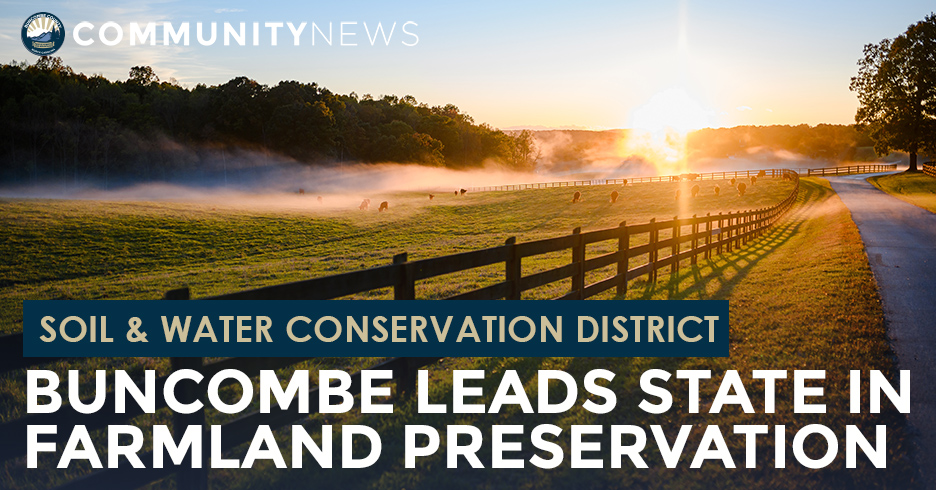This news item expired on Friday, February 19, 2021 so the information below could be outdated or incorrect.

Updated Aug. 6: The Board of Commissioners approved the draft referred to in this article. For more information, click here.
As development continues to bustle in Western North Carolina, Buncombe County is also diligently working toward preserving farmland. Our Soil & Water Conservation District is on the cutting edge of conservation methods and providing financial assistance for conservation. In fact, the County has 314 farms representing more than 24,000 acres in our conservation programs.
So, why is Buncombe County so concerned with farmland preservation? Farmland plays a vital role in the County’s environment, food security, economic impact, community heritage, scenic view sheds, and our overall livelihood. “Agricultural land is a finite natural resource because fertile soils take thousands of years to develop, and once they are destroyed by development there is no way of getting the soils back,” explains County Soil Conservationist Ariel Zijp. Below, you can learn more about why Buncombe County is advocating for protection of more farmland and learn about conservation resources.
2020 Farmland Protection Plan Update
We have submitted the 2020 Farmland Protection Plan update for Buncombe County. In March 2019, Buncombe County Commissioners voted to conduct a Farmland Protection Plan update in order to assess the state of farmland within the county at least every decade. The last Farmland Protection Plan was conducted in 2007 and you can view a copy of the original plan here.
Why do we need a farmland protection plan?
As we see a higher demand for housing in the mountains, we can expect to see farmland continue to disappear. “Agricultural land is typically desirable to development because it tends to be flat and much more affordable to developers than to farmers, because of this developers offer significant asking price that many farmers cannot refuse,” says Zijp. “It’s impossible to put a value on the importance of farmland, when it affects so many different aspects of our livelihood, our culture, and our environment.”
What does a farmland protection plan do?
- Documents rates of farmland loss and creates a baseline: “We are trying to update the farmland protection plan every 10 years. In order to do this, it is important to see what is changing and to access where we are starting since the last plan was completed,” says Zijp. “By doing this, we create our baseline for the next 10 years of action towards protecting farmland.”
- Identifies land under greatest threat of development: “Our greatest threat is growing development. Developers are offering landowners significant amounts of money for undeveloped land,” explains Zijp. Potential development areas are now being prioritized for conservation. “Once we create these priority regions, the Ag Advisory Board can adjust our ranking criteria to promote priority regions and therefore we would be able to focus our efforts on these regions.”
- Creates a plan for the future: Buncombe County’s Farmland Protection Plan was adopted in 2007 and we are updating it. The plan is still in draft mode, so we don’t have quantifiable goals at this time and the plan will be presented to the Commissioners in August 2020 for their vote.
- Allows local leaders to set priorities and goals for farmland preservation: Buncombe County is working with the USDA and NCDA Agricultural conservation easement programs; NC Forest Service to provide forest management plans; NC wildlife commission to provide wildlife management plans; and USDA NRCS to provide conservation plans. We also work within the Soil & Water District to help address resource concerns on farms by encouraging agricultural conservation practices on the farms we are protecting.
How can I preserve my farmland?
Buncombe County’s Soil & Water Conservation District has a variety of methods available that allow property to be preserved and/or continue its agricultural use for generations to come.
- Voluntary Ag District (VAD) Preservation Program: This program that allows farmers to voluntarily enroll their farm property in an agricultural district by signing a conservation agreement stating that they will do no nonfarm development on their property for a period of 10 years. Participating landowners will sign an agreement to sustain, encourage, and promote agriculture and this agreement can be revoked at any time. Some benefits include: Increased protection from nuisance suits and waiver of water and sewer assessments. Find an application here.
- Enhanced Voluntary Ag District (EVAD) Preservation Program: EVAD has all the same benefits and requirements as VAD except that EVAD is a 10 year binding conservation agreement with a conservation deed recorded at register of deeds. This agreement cannot be revoked, and the properties in EVAD are eligible to receive a higher percentage of cost-share funds under the Agriculture Cost Share Program in order to improve their conservation practices on farm. Find an application here.
- Permanent Conservation Easement Agreement: These binding agreements are aimed at keeping land available for farming and forestry in perpetuity while meeting property owners’ needs and production goals. This program permanently protects land to ensure that Buncombe County will have farmland left for future generations. Find an application here.
For more information about farmland preservation, contact Ariel Zijp, 828-250-4794, ariel.zijp@buncombecounty.org.